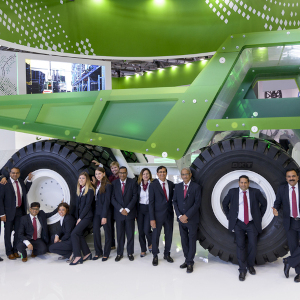When it comes to buying a new excavator, what factors do you consider first? Brand? Price? Performance? Today, we’d like to give you an overview of the latest news in "intelligent excavators" and their features.
When it comes to buying a new excavator for your construction company, what factors do you consider first? Brand? Price? Performance?
Today, we’d like to give you an overview of the latest news in "intelligent excavators" and their features. We are also going to take a close look at what manufacturers are doing in order to meet users’ needs.

Reduced emissions and fuel consumption
Earthmoving equipment and heavy vehicles must adhere to the recent environmental regulation changes, which have limited engine CO2 emissions. Forced to adapt to the new rules set forth, manufacturers are left to reinvent their products so that they comply with legislative requirements.
A shift towards using hybrid engine technology, as we saw in the automotive sector, would significantly lower CO2 emissions. Though some projects and prototypes have been developed over the last few years, the actual application of hybrid engines in large construction equipment is still far off in the future.
There are a few hybrid compact excavators on the market today featuring dual power systems - diesel and electric – that limit CO2 fossil fuel emissions and offer the same performance and power capabilities.
That said, it is a matter of fact that the latest excavators are even "greener" than their forerunners and meet all the recent emission standards established by regulators.
Environmental awareness is important, not only when it comes to limiting pollution, but also in terms of productivity. An engine that pollutes less consumes less. This means, fuel costs are also reduced.
Cabin design
The cabin design in the latest excavators guarantees maximum comfort for its operator:
- soundproof booths muffle construction noise;
- ergonomic seats with back support;
- maximum visibility of surrounding space thanks to large plexi-glass panels and minimum visual obstacles;
- touch-screen display for machinery and systems control and fuel consumption gauges.
Technology
These so-called “intelligent excavators" feature hi-tech systems that make life much easier for their operators: technology plays a major role in controlling the proper functioning of the hydraulic and electrical system, power and consumption.
Some of the most recent models are equipped with real-time technology: the display in the cabin shows the operator in real time the exact position of the blade and the depth of the excavation in progress. According to tests conducted by manufacturers, these new systems are able to reduce the excavator’s travel on site, allowing a 6% savings on fuel and a considerable reduction in working hours.
Operators no longer have to worry about digging too deep or damaging the surface. The control system monitors every movement of the blade, and stops when it reaches the targeted area or depth, improving efficiency, accuracy as well as safety for other site operators.
Moreover, the data related to the excavator (working hours, fuel consumption, GPS location, maintenance alerts) can be accessed remotely and exported easily, allowing for the overall monitoring of the entire fleet.
To streamline operations, some companies have even added integrated systems to their excavators: so, operators can choose from 5 different operating modes using full or partial power depending on the type of job at hand. These systems are programmed to reduce engine power and even turn off the engine if the vehicle is left inactive (powering down after 3-4 minutes), reducing emissions, fuel consumption and noise.
What’s your take on “intelligent excavators"? Could this type of technology help you? Let us know what you think!





